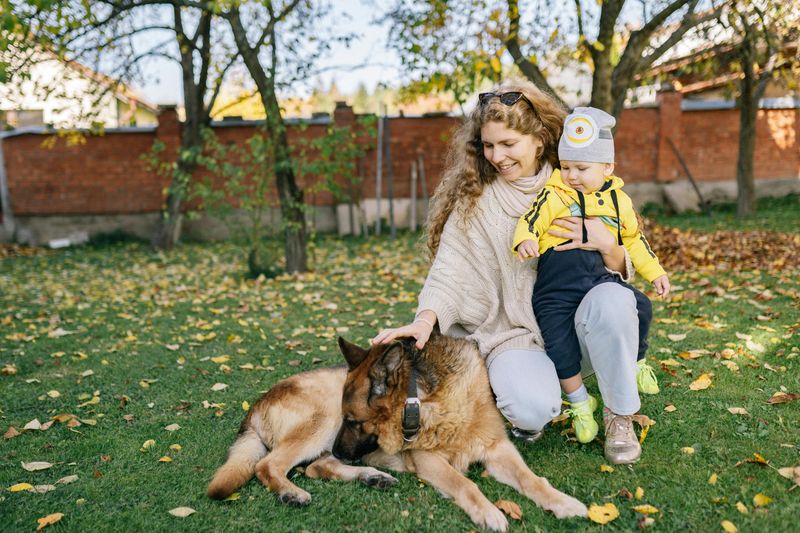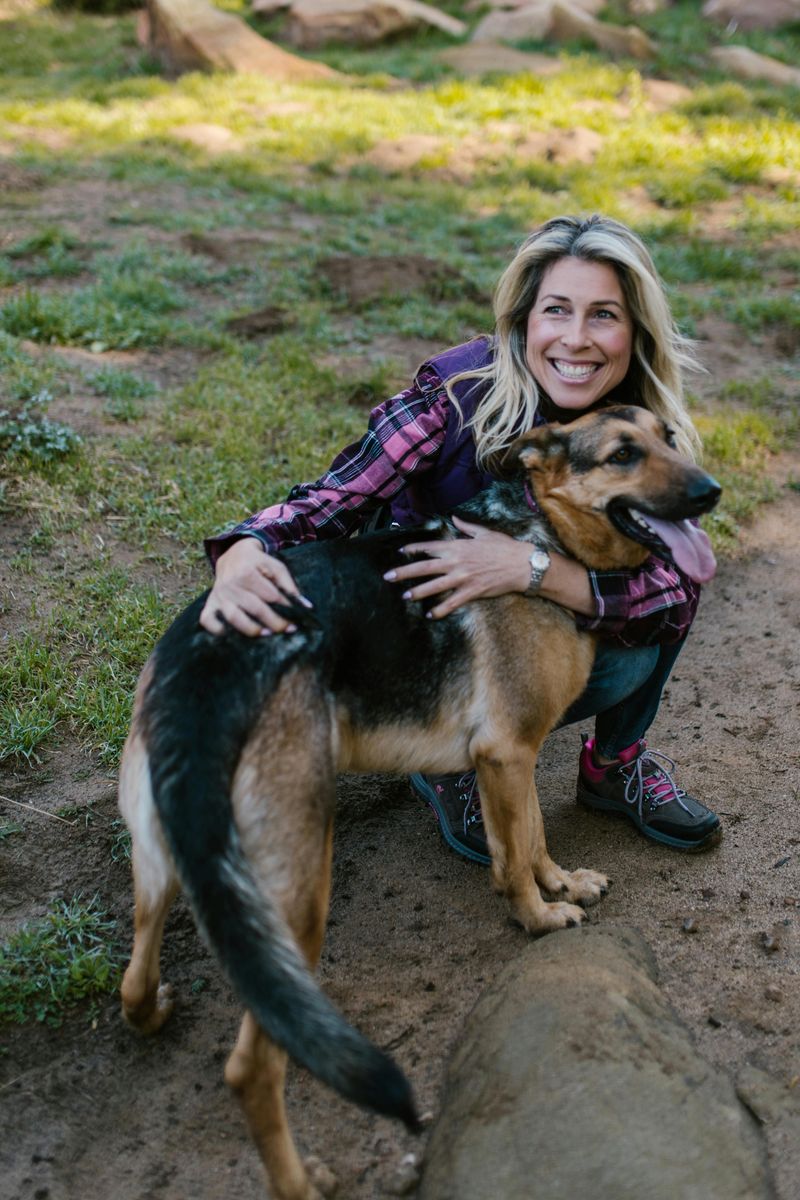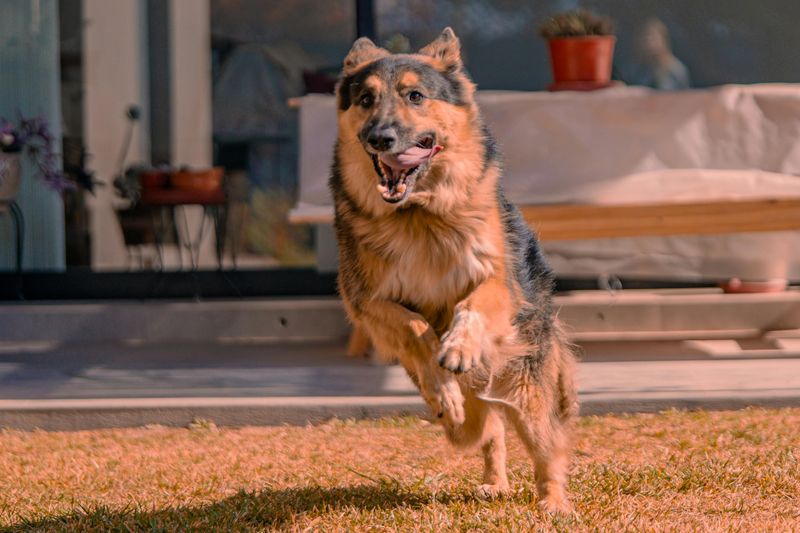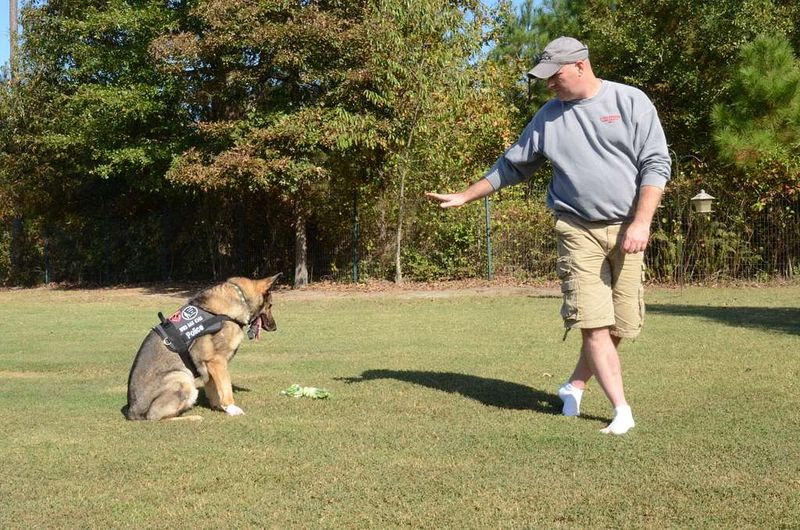German Shepherds are often misunderstood, especially concerning their behavior and aggression. Many myths have led to misconceptions about this remarkable breed. To set the record straight, here are 19 common myths debunked.
German Shepherds are naturally aggressive.
The misconception that German Shepherds are inherently aggressive is widespread but misleading. These dogs are known for their loyalty and intelligence, not aggression. Their behavior largely depends on training and environment.
A well-socialized German Shepherd can be a calm and friendly companion. They respond well to positive reinforcement and understanding, which helps mitigate any aggressive tendencies.
Given proper structure and love, German Shepherds become cherished family members. Their perceived aggression often stems from fear or lack of socialization, not a natural disposition.
Only trained police dogs show aggression.
It’s a common stereotype that only police-trained German Shepherds exhibit aggression. However, these dogs are trained to follow orders and discern threats, not to be aggressive.
In fact, the training emphasizes control and restraint. A well-trained police dog knows when aggression is necessary and when to remain calm.
In everyday life, German Shepherds are capable of being gentle and disciplined. Their behavior is shaped by training, not by an inherent tendency toward aggression, making them excellent protectors and companions.
Aggressive behavior is part of the breed standard.
Contrary to popular belief, aggression is not part of the German Shepherd breed standard. The standard emphasizes traits like intelligence, confidence, and loyalty.
Aggression is typically a sign of improper training or socialization rather than an expected trait. Breed standards guide responsible breeding and training, focusing on developing temperament and adaptability.
A well-bred German Shepherd should be approachable and composed, balancing protective instincts with a reliable temperament. They thrive in environments that encourage balanced behavior, showcasing their true nature.
They can’t live safely with children.
The belief that German Shepherds can’t coexist safely with children is unfounded. Their protective instincts often translate into a nurturing demeanor around kids.
When properly introduced, German Shepherds can form strong bonds with children, displaying patience and playfulness. They become reliable guardians, often acting as a second set of eyes for parents.
Their size and energy do require supervision, especially around younger children, but with proper guidance, they can be loving and gentle family members.
They are not suitable as family pets.
German Shepherds are often perceived as unsuitable family pets due to their size and energy. In reality, their loyalty and intelligence make them ideal companions for families.
They thrive on being part of a family unit, offering protection and affection in equal measure. Their versatility allows them to adapt to various family setups, from active families to those with quieter lifestyles.
Provided they receive adequate exercise and mental stimulation, German Shepherds can be loving and valuable members of any household.
Only male German Shepherds are protective.
The notion that only male German Shepherds are protective is a misconception. Both genders exhibit protective instincts, often influenced by individual personality rather than gender.
Female German Shepherds can be equally vigilant and devoted, creating strong attachments to their families. Their nurturing side complements their protective nature, making them effective guardians.
Each German Shepherd, regardless of gender, will demonstrate protection and loyalty uniquely, reflecting their training and environment. Gender does not determine their ability to safeguard loved ones.
Early socialization can’t change their instincts.
It’s often thought that early socialization can’t alter a German Shepherd’s instincts, but this isn’t true. Early exposure to various environments, people, and animals significantly shapes their behavior.
Through socialization, potential aggressive tendencies can be mitigated, leading to well-adjusted and friendly dogs. They learn to distinguish between threats and normal, everyday occurrences, reducing unwarranted aggression.
A well-socialized German Shepherd can be confident and approachable, interacting peacefully with others. Early experiences play a crucial role in developing a balanced temperament.
Aggression is always caused by genetics.
The belief that aggression in German Shepherds is purely genetic is overly simplistic. While genetics can influence disposition, behavior is also shaped by environment, training, and social experiences.
Aggression often arises from fear, improper training, or lack of socialization rather than genetic predisposition. Understanding these factors allows for behavior modification and guidance.
Owners can foster a peaceful temperament through positive training and nurturing environments, emphasizing the importance of addressing behavioral issues through holistic approaches.
They can’t get along with other dogs.
Many believe that German Shepherds struggle to get along with other dogs. In reality, they can form strong bonds with canine companions given proper socialization and training.
Their intelligence and adaptability enable them to interact well with different breeds, fostering friendships and positive play experiences. Behavior is often reflective of upbringing and environment rather than inherent traits.
With guided socialization and exposure, German Shepherds can enjoy and thrive in the company of other dogs, debunking the myth of isolation.
Rescue German Shepherds are always dangerous.
The assumption that rescue German Shepherds are inherently dangerous is inaccurate. While some may have troubled pasts, many are loving and eager for a second chance.
Rescue organizations assess and rehabilitate dogs, focusing on temperament before adoption. With patience and proper integration, rescues can become affectionate and loyal companions.
Each rescue’s behavior depends on individual experiences, and many thrive in nurturing homes, disproving the myth that they are inherently dangerous or untrustable.
They are too dominant to be trained kindly.
The idea that German Shepherds require harsh training due to dominance is misguided. Positive reinforcement is effective and encourages desired behaviors without fear-based methods.
These dogs respond well to rewards, praise, and consistency, thriving in environments where kindness and understanding prevail. Training success is achieved through patience and empathy, highlighting their willingness to learn.
Gentle training techniques reinforce trust and respect, fostering a strong bond between dog and owner. Dominance myths overlook the breed’s capacity for learning and cooperation.
They are unpredictable around strangers.
The belief that German Shepherds are unpredictable around strangers is often unfounded. Proper socialization teaches them to assess new situations calmly and respond appropriately.
Their protective nature doesn’t equate to unpredictability; instead, they’re taught to discern friend from foe. Training and consistent exposure to different people enhance their ability to interact positively.
A well-socialized German Shepherd can be welcoming and composed around guests, reflecting their adaptability and learned behavior.
Guarding breeds can’t be affectionate.
Thinking that guarding breeds like German Shepherds can’t show affection is a misconception. Their protective instincts are matched by an ability to display warmth and loyalty.
These dogs often form strong emotional bonds with their families, offering both security and affection. Their loving nature is evident in everyday interactions, from snuggles to playful antics.
A well-balanced German Shepherd demonstrates that protection and affection coexist, enriching family life with their dual roles.
German Shepherds are always territorial.
The notion that German Shepherds are always territorial overlooks their ability to adapt and be sociable. While they may have protective instincts, they can also welcome new experiences and environments.
Training and socialization teach them to differentiate between home and public spaces, reducing unwarranted territorial behavior. Exposure to various settings fosters adaptability and reduces perceived threats.
A well-adjusted German Shepherd engages confidently in diverse locales, showing that territorial behavior is manageable and not all-encompassing.
They’re too “serious” to be playful.
The idea that German Shepherds are too serious to enjoy playtime is misleading. Their lively and curious nature makes them eager participants in games and fun activities.
They enjoy mental challenges and physical activities, thriving in environments that stimulate both body and mind. Playfulness enhances their bond with owners, offering joy and companionship.
Despite their work-focused reputation, German Shepherds relish leisure time, dispelling the myth that they lack a sense of fun and adventure.
They require harsh discipline to behave.
The misconception that German Shepherds need harsh discipline ignores the breed’s responsiveness to positive methods. They excel in environments that reward good behavior through kindness and consistency.
Harsh discipline can lead to fear and mistrust, hindering their natural eagerness to please. Positive training fosters confidence and compliance without fear.
By focusing on rewards and encouragement, owners can cultivate a well-behaved and trusting German Shepherd, proving that gentle methods are both effective and necessary.
Aggressive behavior means a “bad dog.”
Viewing aggressive behavior as a sign of a “bad dog” stigmatizes German Shepherds and oversimplifies complex behavior. Aggression can stem from fear, stress, or misunderstanding, not an inherent flaw.
Understanding the root cause is essential for addressing behavior. With empathy and professional guidance, many aggressive tendencies can be redirected.
Aggression doesn’t define the dog; it highlights areas needing attention and care, allowing for growth and transformation with the right support.
Females are always calmer than males.
The assumption that female German Shepherds are always calmer than males is a generalization that doesn’t hold true. Temperament varies individually based on personality and upbringing, not solely gender.
Both males and females can exhibit a range of behaviors from energetic to relaxed, depending on environment, training, and socialization.
Each dog should be assessed on its unique traits rather than gender stereotypes, recognizing that a calm demeanor is achievable in both sexes.
Police training makes them dangerous pets.
The myth that police training renders German Shepherds dangerous as pets overlooks the discipline and control instilled in these dogs. Training emphasizes obedience and situational awareness, not aggression.
Many retired police dogs transition smoothly into family life, displaying loyalty and adaptability. Their training often enhances their ability to integrate and protect without undue aggression.
Police-trained German Shepherds bring a wealth of experience and reliability, proving that their training enhances rather than hinders their role as a family pet.



















